Comprehensive Detailed Guide about Organic Honey
Table Of Contents

- Introduction to Organic Sugar
- Benefits of Organic Sugar
- Environmental Benefits
- Taste and Culinary Benefits
- Nutritional Value of Organic Sugar
- Organic Sugar Production
- Processing Methods
- Certification Standards
- Comparison between Plain Sugar and Organic Sugar
- Myths and Facts about Organic Sugar
- Debunking Myths
- Organic Sugar Conclusion
- takeaway
- Buy Our Organic Sugar
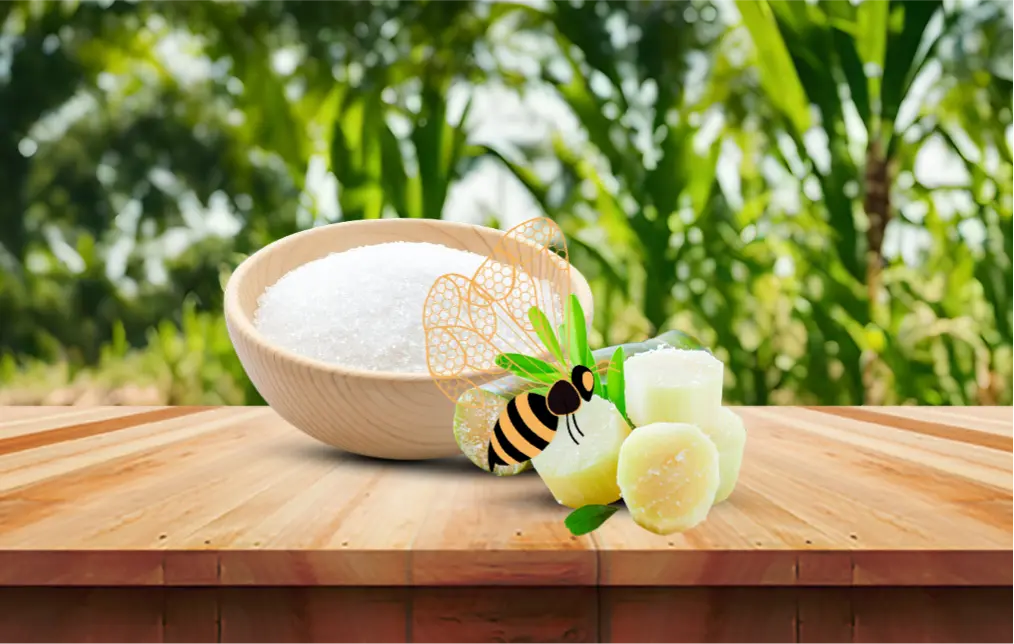
Introduction to Organic Sugar
Organic sugar refers to sugar that is produced from 100% sugar cane or sugar beets grown using organic farming methods. These methods exclude the use of synthetic pesticides, herbicides, and genetically modified organisms (GMOs). Organic sugar is processed without the addition of artificial additives or chemicals, preserving its natural properties and ensuring a more sustainable and environmentally friendly production process.
 Historical Background
Historical Background
The cultivation of sugarcane dates back thousands of years, with its origins traced to regions such as India, Brazil and China. The production and consumption of sugar spread globally through trade routes, leading to the establishment of sugar plantations in various parts of the world. The industrial revolution further accelerated sugar production, leading to the widespread use of refined sugar in food and beverages. However, concerns over the environmental impact and health implications of conventional sugar production practices led to the rise of organic sugar as a more sustainable and healthier alternative.
 Importance of Organic Certification
Importance of Organic Certification
Organic certification plays a crucial role in ensuring the integrity and authenticity of organic sugar products. Certification bodies set standards that organic sugar producers must adhere to, including guidelines on farming practices, processing methods, and labeling requirements. Organic certification assures consumers that the sugar they are purchasing has been produced in compliance with organic standards, free from synthetic chemicals and genetically modified ingredients. By choosing certified organic sugar, consumers support sustainable agriculture practices and contribute to the preservation of biodiversity and soil health. Organic certification also provides transparency in the supply chain, allowing consumers to trace the origin of the sugar and verify its organic status.
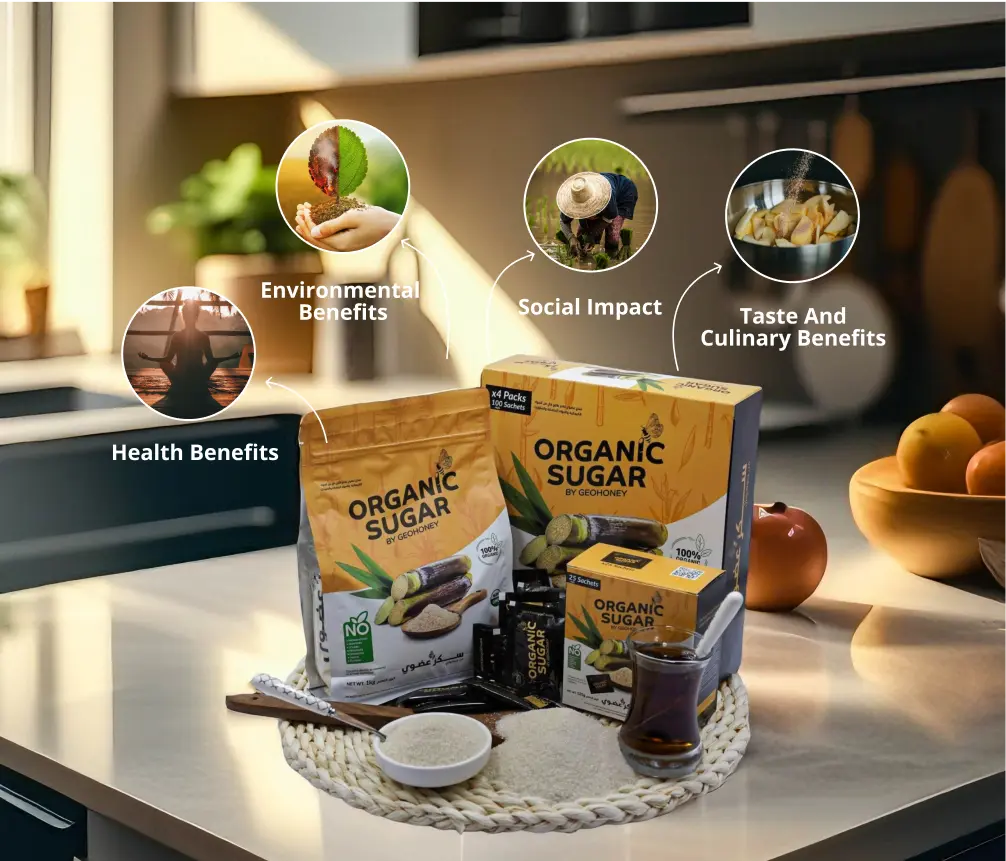
Benefits of Organic Sugar
Health Benefits
-
Nutrient - Rich
Organic sugar retains more vitamins, minerals, and antioxidants compared to refined sugar due to minimal processing.
-
Lower Glycemic Index
Organic sugar may have a lower glycemic index than refined sugar, leading to a slower rise in blood sugar levels and potentially reducing the risk of insulin spikes.
-
Reduced Chemical Exposure
Organic sugar is free from synthetic pesticides and chemicals, reducing the risk of exposure to harmful substances that are commonly used in conventional sugar production.
Environmental Benefits
-
Sustainable Farming Practices
Organic sugar production promotes sustainable agricultural practices such as crop rotation, composting, and natural pest control, which help preserve soil health and biodiversity.
-
Reduced Environmental Impact
By avoiding synthetic chemicals and GMOs, organic sugar cultivation reduces pollution, conserves water resources, and promotes ecosystem balance.
-
Carbon Footprint Reduction
Organic farming methods typically result in lower greenhouse gas emissions, contributing to climate change mitigation and environmental sustainability.
Social Impact
-
Support for Small Farmers
Organic sugar production provides opportunities for small-scale farmers to adopt organic practices, diversify their income sources, and improve their livelihoods.
-
Community Development
Organic sugar projects often invest in community development initiatives, such as education, healthcare, and infrastructure improvements, benefiting local populations and fostering sustainable development.
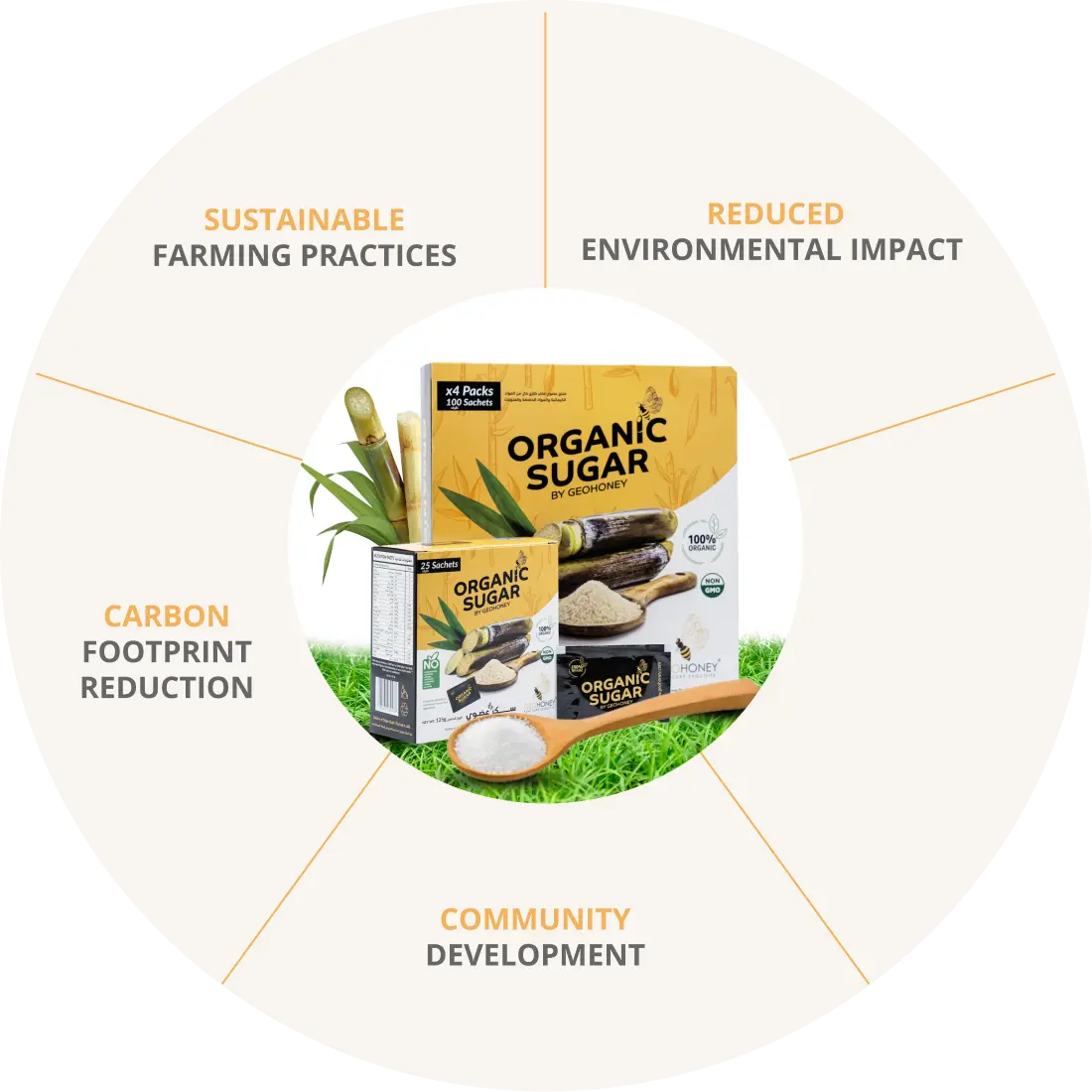

Taste and Culinary Benefits
-
Rich Flavor Profile
Many chefs and culinary enthusiasts prefer the taste of organic sugar, noting its richer and more complex flavour compared to refined sugar.
-
Enhanced Texture
Organic sugar can contribute to the texture and moisture content of baked goods and desserts, resulting in a more satisfying culinary experience.
-
Versatile Ingredients
Organic sugar can be used in a variety of culinary applications, from baking and cooking to sweetening beverages and sauces, adding depth and sweetness to dishes.
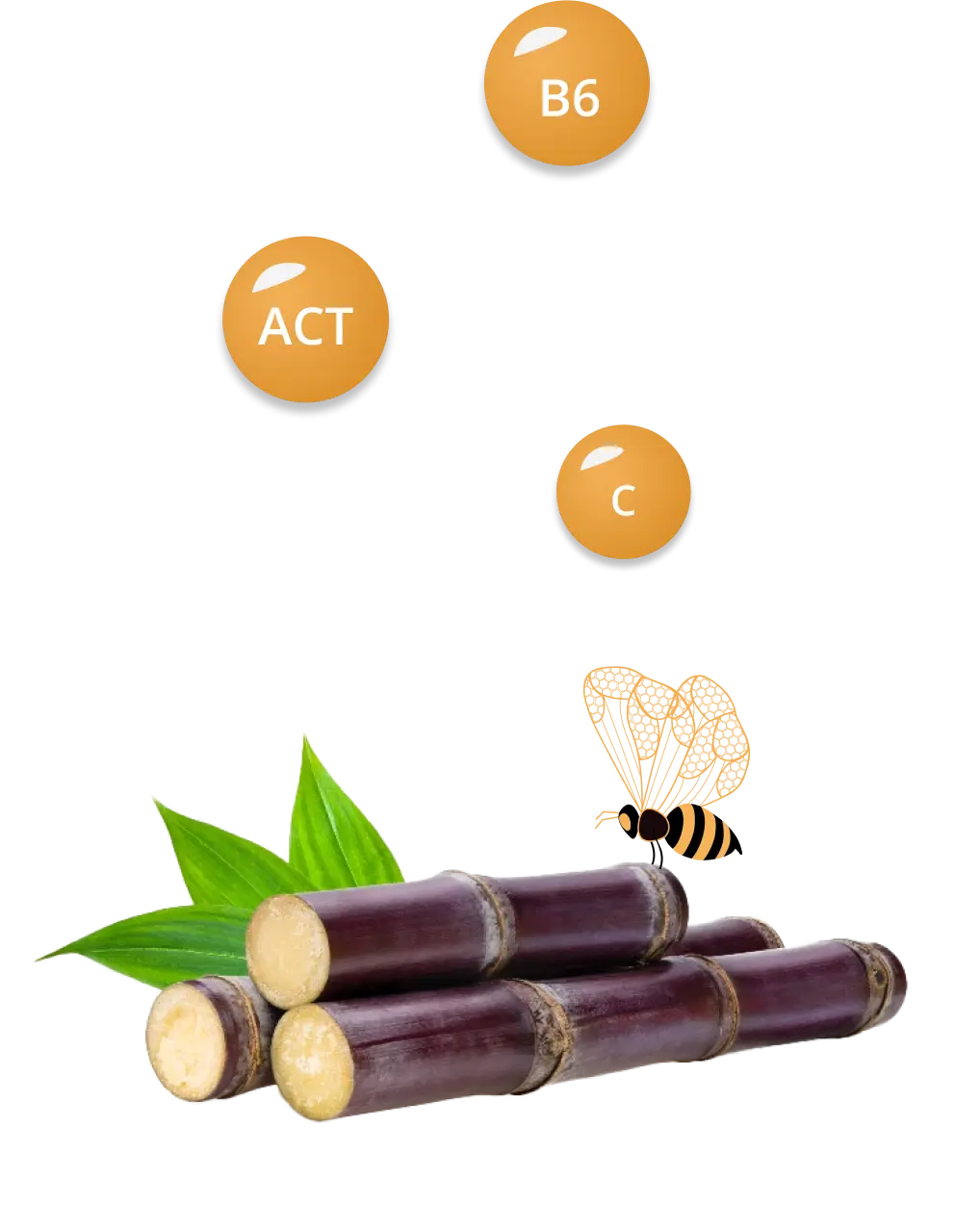
Nutritional Value of Organic Sugar
Vitamins and Minerals Content
-
Antioxidants
Organic sugar retains antioxidants present in molasses, such as flavonoids and phenolic compounds, which help combat oxidative stress and protect cells from damage.
-
Vitamin B6
Organic sugar can be a source of vitamin B6, which plays a crucial role in metabolism, brain function, and immune system support.
-
Vitamin C
Some organic sugars may contain vitamin C, an essential nutrient that supports immune function, collagen production, and overall health.
Impact on Health
-
Moderate Consumption
While organic sugar offers some nutritional benefits, it should still be consumed in moderation as part of a balanced diet.
-
Energy Source
Organic sugar provides a quick source of energy due to its carbohydrate content, making it a suitable choice for replenishing energy levels during physical activity.
-
Digestive Health
The molasses content in organic sugar may have a mild laxative effect and promote healthy digestion when consumed in appropriate quantities.
-
Skin and Hair Health
Some vitamins and minerals present in organic sugar, such as vitamin C and antioxidants, may contribute to skin health, collagen production, and hair strength when consumed as part of a nutrient-rich diet.
Organic Sugar Production
Farming Practices
-
Organic Certification Requirements
Organic sugar production begins with adhering to strict organic farming standards set by certification bodies. These standards prohibit the use of synthetic pesticides, herbicides, and genetically modified organisms (GMOs) in the cultivation of sugar cane or sugar beets.
-
Crop Rotation
Organic sugar farmers often practice crop rotation to maintain soil fertility and reduce pest pressure. Rotating sugar cane or sugar beets with other crops helps prevent soil depletion and promotes biodiversity.
-
Natural Pest Control
Organic sugar farmers utilize natural pest control methods such as beneficial insects, trap crops, and companion planting to manage pests without relying on chemical pesticides.
-
Composting and Soil Health
Organic sugar production emphasizes the use of compost and organic fertilizers to nourish the soil, enhance soil structure, and promote microbial diversity for sustainable crop growth.
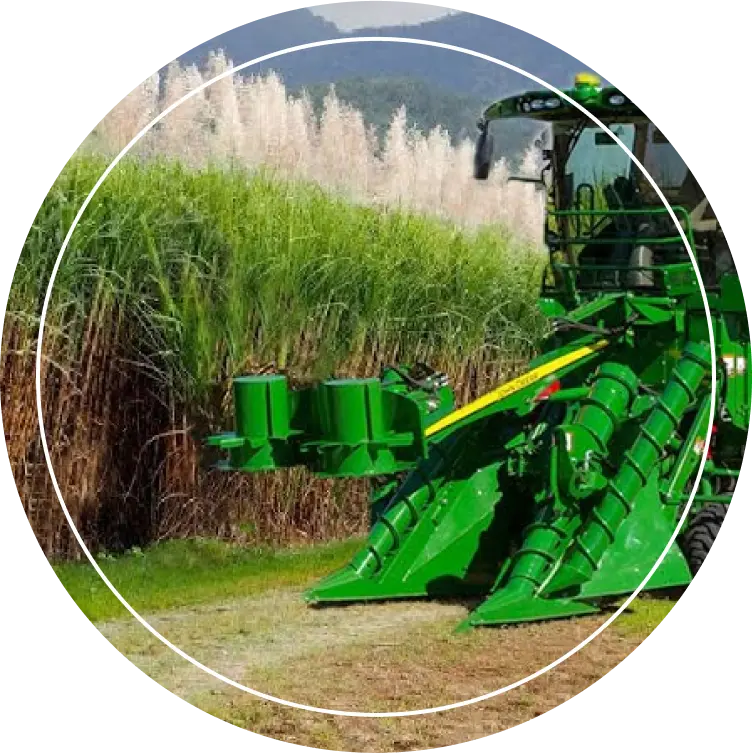

Processing Methods
-
Minimal Processing
Organic sugar processing involves minimal steps to retain the natural properties of the sugar cane or sugar beets. This includes crushing the raw material, extracting the juice, and evaporating it to form sugar crystals.
-
Molasses Retention
Unlike refined sugar production, organic sugar processing often retains some molasses in the final product. Molasses contain vitamins, minerals, and antioxidants that contribute to the nutritional value of organic sugar.
-
No Chemical Additives
Organic sugar processing avoids the use of chemical additives, bleaching agents, or synthetic preservatives commonly found in conventional sugar refining processes. This ensures a more natural and pure sugar product.
Certification Standards
-
Organic Certification Bodies
Organic sugar producers must obtain certification from recognized organic certification bodies such as the USDA Organic, EU Organic, or other national or international organic certification programs.
-
Compliance with Standards
Certification standards for organic sugar production cover various aspects, including farming practices, processing methods, storage, transportation, and labeling. Producers must comply with these standards to maintain their organic certification.
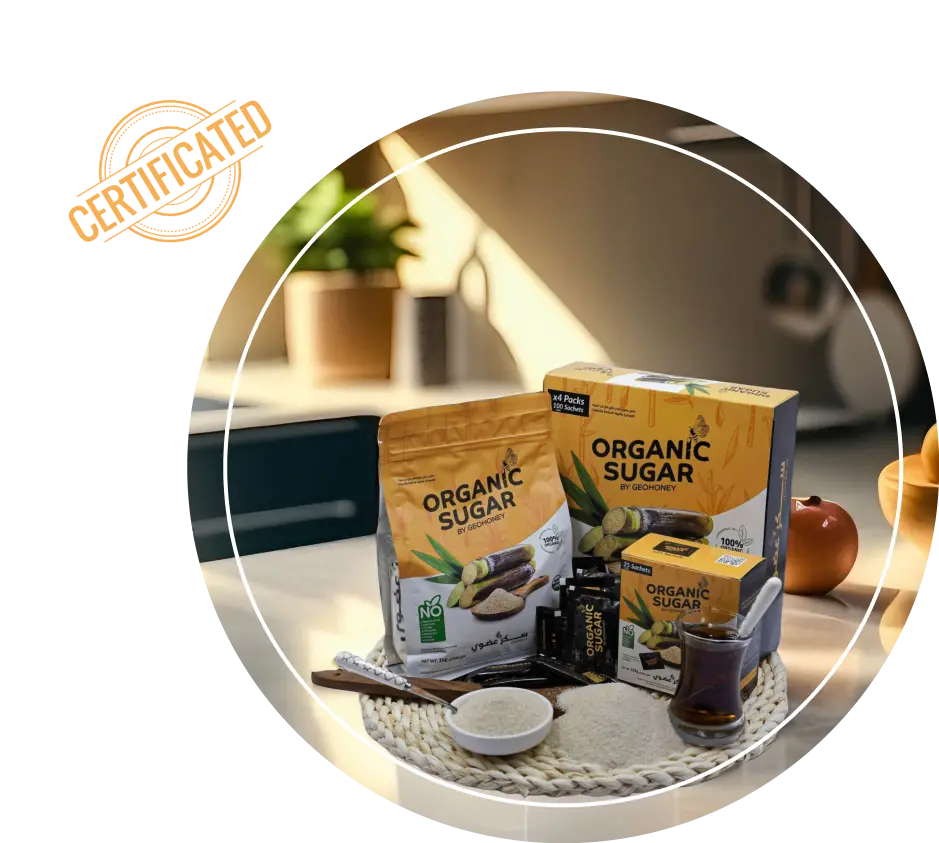
Comparison between Plain Sugar and Organic Sugar
|
|
|---|---|
|
Refined sugar is typically derived from sugarcane or sugar beets. The refining process involves stripping away molasses and impurities, resulting in a white, crystalline product. |
Organic sugar is sourced from sugarcane or sugar beets that are grown without synthetic pesticides or fertilizers. Organic sugar processing involves minimal refining to maintain more of the natural nutrients and flavors. |
|
Refined sugar is often considered "empty calories" as it provides energy in the form of sucrose but lacks significant nutritional value. |
Organic sugar may contain trace amounts of minerals like iron, calcium, and potassium due to its less processed nature, providing slightly more nutritional value than refined sugar. |
|
Refined sugar may contain residues of pesticides and chemicals used during cultivation and processing. |
Organic sugar is free from synthetic pesticides and chemicals, offering a cleaner alternative for those concerned about chemical exposure. |
|
Conventional sugar production often involves intensive use of synthetic chemicals and may contribute to environmental degradation. |
Organic sugar farming practices prioritize sustainability, soil health, and biodiversity conservation, making it a more environmentally friendly choice. |
|
Refined sugar has a consistent, neutral taste and fine texture that is commonly used in a wide range of food products. |
Organic sugar may have a slightly different taste profile due to its less refined nature, offering a subtle hint of molasses or caramel notes. |
|
Refined sugar has a consistent, neutral taste and fine texture that is commonly used in a wide range of food products. |
Organic sugar may have a slightly different taste profile due to its less refined nature, offering a subtle hint of molasses or caramel notes. |
|
Partially Natural |
✓ 100% organic |
|
Additives |
✓ No Additives |
|
Colors added |
✓ No Colors |
|
GMO added |
✓ GMO Free |
|
Allergens |
✓ Allergen free |
|
Pesticides Used |
✓ No pesticides |
|
Chemicals Used |
✓ No Chemicals |
|
Flavors added |
✓ No Flavors |
|
Fertilized Soil |
✓ Natural Soil |
|
Massive Production |
✓ Limited Production |
|
Not Healthy |
✓ Healthy |
Myths and Facts about Organic Sugar
Addressing Common Misconceptions
 Myth
MythOrganic sugar is calorie-free.
 FACT
FACTCertification standards for organic sugar production cover various aspects, including farming practices, processing methods, storage, transportation, and labeling. Producers must comply with these standards to maintain their organic certification.
 Myth
MythOrganic sugar is not sustainable.
 FACT
FACTOrganic sugar production promotes sustainable farming practices, such as crop rotation, natural pest control, and soil health preservation. By avoiding synthetic chemicals and GMOs, organic sugar cultivation helps protect the environment and support long-term agricultural sustainability.
 Myth
MythOrganic sugar is not different from conventional sugar.
 FACT
FACTOrganic sugar is produced without synthetic pesticides, herbicides, and GMOs, making it a more environmentally friendly and potentially healthier option compared to conventional sugar. Organic sugar also retains more of its natural nutrients and beneficial compounds due to minimal processing.
Debunking Myths
 Myth
MythOrganic sugar is tasteless.
 FACT
FACTOrganic sugar can have a richer and more complex flavor profile compared to refined sugar due to the retention of molasses during processing. Many people prefer the taste of organic sugar for its subtle caramel notes and natural sweetness.
 Myth
MythOrganic sugar is not affordable.
 FACT
FACTWhile organic products may sometimes be priced higher than conventional counterparts, the availability of organic sugar options has increased in recent years, making it more accessible and affordable for consumers looking to make healthier and more sustainable choices.
 Myth
MythOrganic sugar is not regulated or certified.
 FACT
FACTOrganic sugar production is subject to strict regulations and certification standards set by recognized organic certification bodies. Producers must comply with these standards to obtain and maintain organic certification, ensuring transparency and quality in the organic sugar supply chain.
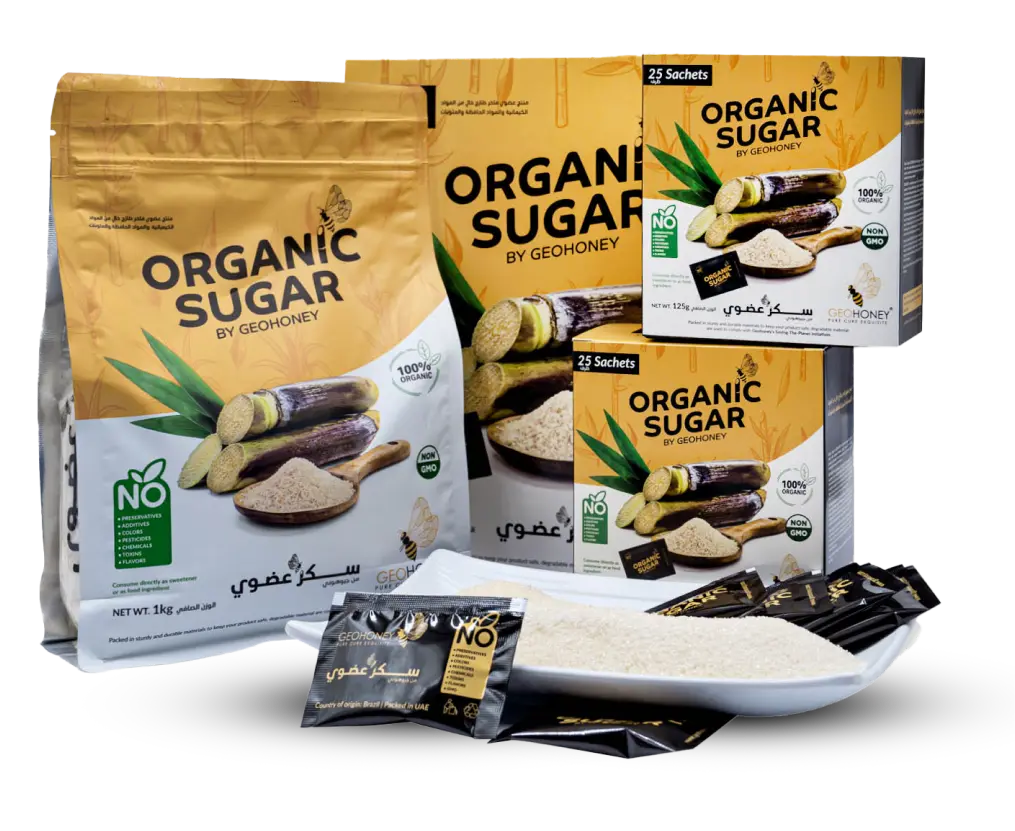
Organic Sugar Conclusion
Future Outlook
-
Increasing Demand
As consumers become more health-conscious and environmentally aware, the demand for organic sugar is expected to rise.
-
Innovation in Production
Ongoing research and development in organic sugar production methods may lead to advancements in sustainability, efficiency, and product quality.
-
Diversification of Products
Manufacturers are likely to introduce a wider range of organic sugar products, catering to diverse culinary preferences and dietary needs.
-
Global Expansion
Organic sugar production is expanding globally, offering opportunities for farmers, producers, and consumers to embrace organic and sustainable sugar alternatives.
Takeaway
You can be confident that the Organic sugar you purchase from Geohoney is pesticides, herbicides, and GMOs-free and is 100% natural. It's a fantastic option for anyone who wishes to benefit from its natural properties and ensure a more sustainable and environment friendly product.
Why wait then? Discover the new organic product and health advantages of Geohoney's Premium Organic Sugar by giving it a try right away.
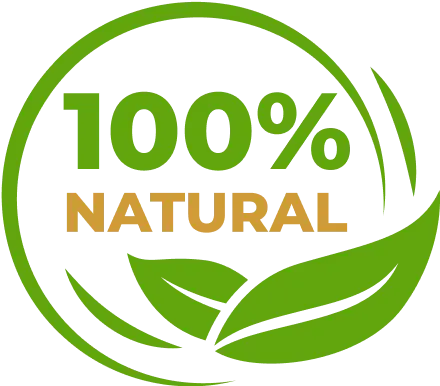
BUY OUR ORGANIC HONEY
What’s the buzz, Join the hive !
SIGN UP TO OUR NEWSLETTER
Be the first to know about our hot deals, new arrivals.





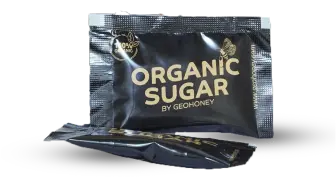
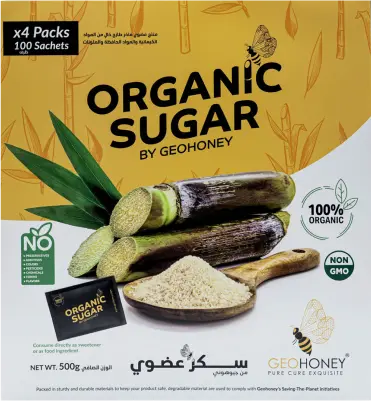


 Pay By Cards
Pay By Cards
 PayPal
PayPal
 Stripe
Stripe
 Other Payment Methods
Other Payment Methods










